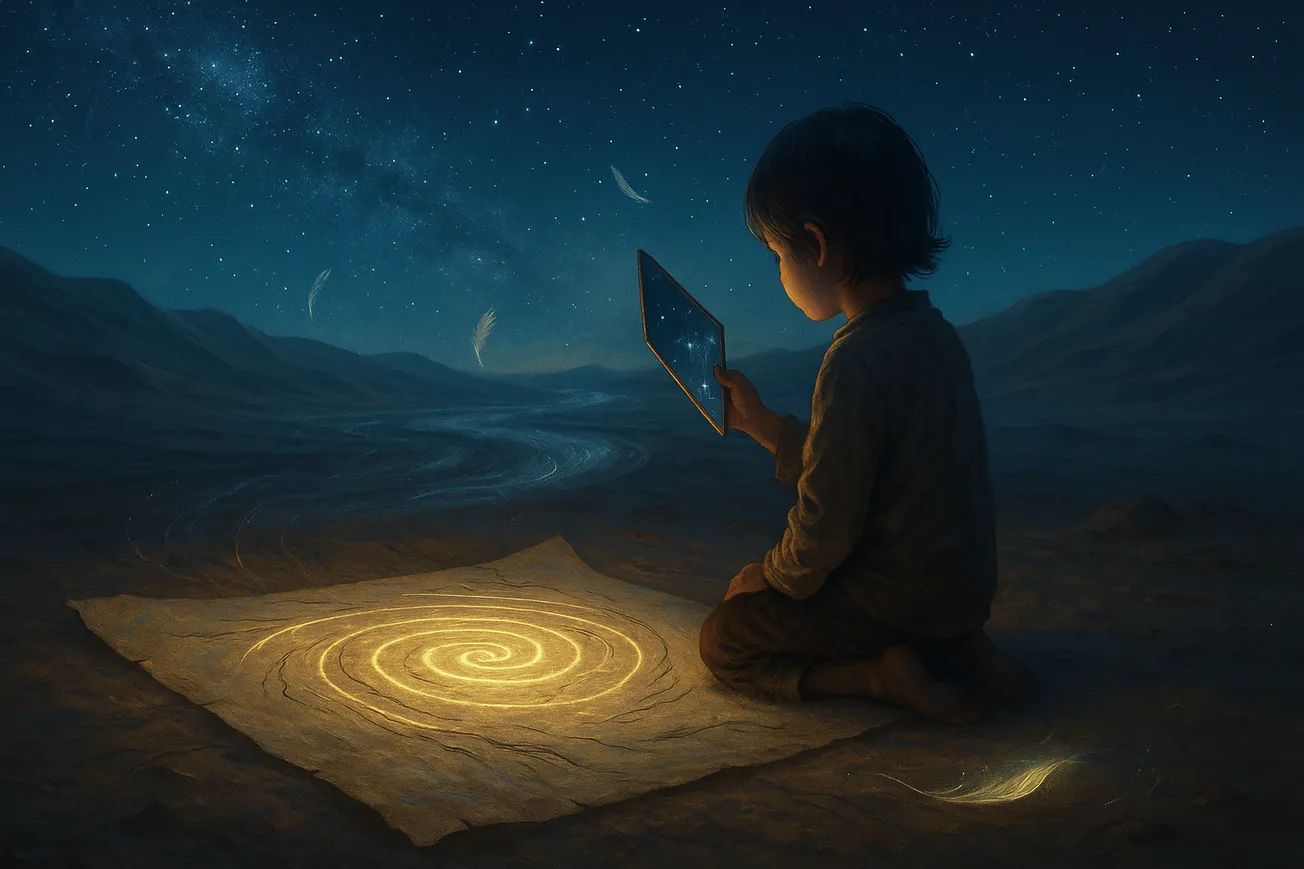🌈 The Fractal Story Engine | Death & Beyond (Afterlife) | (18) DB-002-F2
In the city of Ahrat Fel, every newborn is given two things: a name carved into basalt and a sealed parcel made of blue waxcloth. The name is for the city’s records. The parcel is never opened.
Some said it was a gesture. Others said it was a sentence. No one knew who first began the ritual or what lay inside the folds. By age six, most children knew not to ask. Curiosity vanished the way rivers sink into stone: slow, total, irreversible.
But Pira was a cartographer’s daughter.
And her mother kept a forbidden map.
It was not a map of rivers, roads, or stars. It was a map of sandglasses, each drawn with a name and a spiral trail leading out, ending always at a glyph scratched in ink that shimmered red. Her own sandglass stood in the lower left, unbroken, the grains steady and whole. At night, she would run her finger along the spiral, tracing its loops like a lullaby.
On her tenth Naming Day, when the city conducted the annual Bonewind Census, a stranger knocked on the roof during the dusk drums. He wore no colors. Not gray. Not black. Just absence.
He asked only one question: “Has the child opened her letter?”
The mother said, “No.”
The stranger nodded once and walked away.
Pira, who had been hiding under the floorbeam with the cat, felt a grain of time fall sideways in her chest. The world had shifted. And the map began to hum.
Two years passed before she found the courage to ask.
“Why doesn’t anyone open them?” she said, one afternoon while her mother boiled reeds.
Her mother did not look up. “Because the day you read it is the day you must obey it.”
“But what if it isn’t true?”
Her mother stirred the reeds. “Then you are still obeying it.”
That night, Pira stole a second map from the census vault. It was an aged one, brittle as onion paper, marked with unfamiliar names. Many of the spirals ended early. Some burned out in a single line. A few had no end at all, spirals incomplete, ink still wet decades after it should have dried.
Pira’s breath grew shallow as she read the note etched in the margin:
These are the names who never opened.
The next morning, she carried her blue waxcloth parcel to the tallest dune beyond the city wall. It was forbidden to cross the Glassline, but she stepped past the broken chain and climbed until the horizon tilted.
The wind was silent, the sand warm.
She unfolded the letter.
There were no instructions. No prophecy. Only a circle. And inside the circle, a mirror shard and a line of words:
What you believe becomes the map.
She waited for lightning. For a quake. For a scream across the sky.
But the world did nothing.
Only the cat, who had followed her silently, lay beside her and purred.
When she returned to the city, she no longer saw paths. She saw spirals. Spirals in the layout of market stalls. Spirals in the way smoke rose from chimneys. Spirals in the laughter of children leaping over the rain gutters.
Pira took ink and reed and began to redraw the maps. Not of sandglasses now, but of turning doors. Each person had one. Most were closed.
Some could be nudged.
Others had already begun to open from the inside.
Years passed. The Bonewind Census grew quiet. No strangers came.
Until one dusk, a knock echoed on her roof.
She opened the door before it sounded again.
The same stranger stood before her, but aged backward. His face was younger. His eyes held less knowing.
“You’ve altered the routes,” he said.
“No,” said Pira. “They were never fixed.”
He held out his own parcel. It had never been opened.
She reached into her robe and drew out a mirror shard, still warm from her chest.
He looked into it.
And wept.
Not because he saw his fate.
But because he saw that he had one still to choose.
The wind changed direction that night.
Some said it was nothing.
Others said it was the map rewriting itself.

